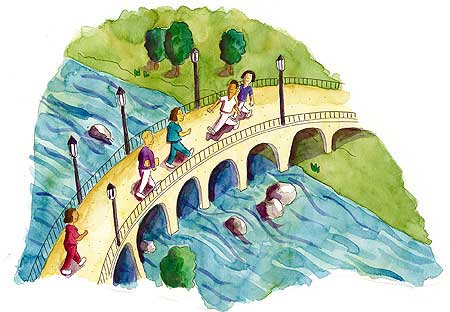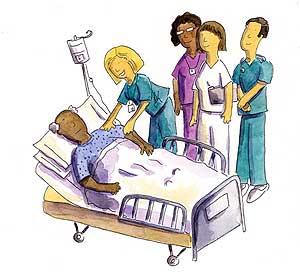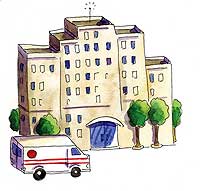There’s never been a more exciting time to pursue a career in nursing. Our game board offers just a glimpse of the tantalizing possibilities that await today’s new grads. Read below to explore the real-life career trajectories of five alumni who are thriving in this rapidly evolving profession.
By Ming Tai

Setting Career Goals… and Beating Them
| Elizabeth (Betty) Taylor Jordan Academic credentials: Diploma in Nursing (1982); BSN (1984), MSN (1998), Business of Nursing Certificate (JHUSON 1998), DNSc (JHUSON 2004) Career Highlights: |
In her 23 years of nursing at Johns Hopkins, Betty Jordan has found strength in the support she consistently receives from mentors. “I’ve always been in a supportive environment with good role models, both at the School of Nursing and at the hospital,” she says. “They’ve always encouraged me to move forward.”
Jordan, now an instructor and director of the Birth Companion Program at the School of Nursing and a consultant for the Maternal Newborn Care Program at Johns Hopkins HealthCare, first came to the Johns Hopkins Hospital in her senior year at the St. Joseph Nursing School. “The nurses in OB-GYN helped define what I wanted to do in nursing,” she says. “I liked the excitement and busy pace of labor and delivery.”

After earning her diploma in nursing from St. Joe’s, Jordan took a clinical nurse position at Hopkins, first in the perinatal unit and later in labor and delivery. While working at Hopkins, she continued her education, earning a BSN from the University of Maryland in 1984 and an MSN from the University of Delaware School of Nursing in 1989.
“At that point, I could have been groomed for something else—a nurse manager perhaps—but someone saw I had a knack for teaching and education, and suggested I pursue that.”
Jordan became a clinical instructor at the Hopkins School of Nursing while continuing to hold a joint appointment at the Hospital. By the late 1990s, nearly 10 years had gone by since Jordan was herself a student. She wasn’t sure she was ready to pursue a doctoral degree. Luckily, Hopkins was offering a new program that intrigued her.
“I thought the Business of Nursing Certificate program courses were compelling, particularly the clinical outcomes course,” she says. “It was time to get my feet wet again in terms of education.”
Immediately after completing the certificate program, Jordan started looking for a doctoral program. She found she had a head start: the 12 credits she accrued in the BoN program were accepted as electives toward her doctoral degree at Hopkins.
Jordan describes her career trajectory as focused and straightforward. She aimed to earn a master’s degree before having her daughter, Brooke, and to complete the doctoral program before Brooke entered high school, a goal she accomplished last year, one year early. “It was perfect,” she says. “If I had to do it all over again, I would do it the same way… maybe sooner.”
Next up for this nurse: clinical research. “I’ve established my teaching career and my practice career,” she says. “Next I plan to pursue research grants with help from my mentors.”
Partners in Life—and Vocation
| Steve Gonsalves Academic Credentials: BS in Life Sciences and Exercise Sciences (1986); MPH (1995), BS in Nursing (JHUSON 1997), MSN/FNP (JHUSON 2000)Career Highlights: Career Highlights: |
Most students in the accelerated baccalaureate program find the intense pace challenging. The reward is earning a baccalaureate degree in just 13 months. For two students in the 1997 accelerated class, the program led them to a baccalaureate degree, followed shortly by another special occasion—an engagement.
MaryLynn Youngwerth was in the school’s computer lab the first week of the program, trying to create a PowerPoint presentation about her Peace Corps experience in New Guinea. Classmate Steve Gonsalves stopped by to help her with a question. When he glanced at the computer screen, he saw that he and MaryLynn had a connection: Steve was also a Returned Peace Corps Volunteer, having served in Ecuador.

The two quickly discovered the similarities didn’t stop there. They had served in the AmeriCorps program, both had master’s degrees in public health, and they had similar nursing career goals. “We became really good friends and study partners, and it evolved from there,” says MaryLynn. “We had similar family backgrounds in that we moved around a lot, so travel and adjusting to new situations were nothing new to either of us.”
Traveling was exactly what the couple did after graduation. They went to Hawaii for vacation and for MaryLynn to meet Steve’s parents. Because they didn’t have time to take the NCLEX exam before leaving for Hawaii, they took it there, the day after they arrived. Then, while in Hawaii, they got engaged.
Upon returning to Baltimore, the couple took jobs at the Johns Hopkins Hospital—MaryLynn in pediatrics and Steve in cardiology. Since they were both on the same floor, they sometimes could sneak meals together. After a year, they both entered the Family Nurse Practitioner program at Johns Hopkins.
The similarities continued. MaryLynn and Steve were both named National Health Service Corps Scholars. After earning their NP degrees, the couple moved to New York City, where Steve joined the Public Health Service and MaryLynn worked for the Ryan-NENA community health center, supervising the Women’s Health Department. They lived in Brooklyn and took the same subway to work each morning, splitting at one point for Steve to go into the Lower East Side while MaryLynn went to the Lower West Side.
Then came September 11, 2001, and the clinic in which Steve was working closed. For two weeks, he provided medical care to firemen and iron workers at Ground Zero. “I knew
I was in the right job at that point,” says Steve. “I had the ability to be there and to help.”
The couple now lives in California, where MaryLynn is a Family Nurse Practitioner at Family Health Centers of San Diego and Steve is a Health Services Administrator with the Public Health Service in the Division for Immigration Health Services. The future holds many possibilities for this duo—expanding careers, doctoral degrees, overseas travel and work—possibilities that they no doubt will tackle together.
Finding Value in a New Direction
| Christopher Robel Academic Credentials: Some courses at Essex, then pre-nursing concentration at Catonsville Community College; BS in Nursing (JHUSON 1998); MS in Nurse Anesthesiology (2001)Career Highlights: |
As a young high school graduate, Christopher Robel’s goals were clear: Go into business and make a lot of money. He earned an AA degree and was on his way to becoming a chartered financial planner. As he worked on estate planning for doctors, nurses, and attorneys at the Paul Revere Insurance Group, however, he became interested in the medical profession.
“I wanted to do more with my life,” he says. The more he talked with clients who were nurses, the more he realized nursing was the answer.
When he gave notice at work and announced he was going to become a nurse, his manager was skeptical. “He asked if I had any idea how long it was going to take me,” Robel says. But his mind was set. “I floated through my 20s,” he says. “When it hit me that this is what I wanted to do, I got on the beeline.” He immediately began taking prerequisite courses at a local community college and entered the traditional baccalaureate nursing program at Johns Hopkins the following year. He was soon drawn to anesthesiology because of its technical aspect.
The field of nurse anesthesiology pays well; reported annual salaries averaged $113,000 in 2001 according to the American Association of Nurse Anesthetists. Nurse anesthetists who do private contracting can earn more than double that. But Robel says his first priority is being able to help patients.
“I come home from work and feel good about what I’ve done,” he says. “I’ve helped someone get through surgery.”
Just over 10 years from the time he decided to change careers, Robel is now a certified registered nurse anesthetist and owner of Baltimore Anesthesia Associates, LLC.
“I like going to work every day,” he says. Robel may one day take on a more administrative role, and he eventually wants to earn a doctoral degree, possibly a DNP. But he plans on always seeing patients.
“I like my job so much,” he says. “I’ll never give up the clinical practice of anesthesiology.”
“Priceless” Service to the United States
| Christine Johnson Academic Credentials: |
If Christine Johnson were president, she would make military service a mandatory requirement for nursing school graduates.
“I believe every nurse should join the military for at least two years,” she says, rattling off the benefits of military service: discipline, leadership skills, critical thinking skills, and a sense of honor and duty.
Though she always held an interest in the military, Johnson, now a lieutenant colonel in the Army Nurse Corps, was a civilian nurse for 14 years before realizing her dream. She worked in Veterans Affairs and the Public Health Department, always moonlighting with extra jobs in home care, nursing homes, and private care. Then came the day when her son was in the Army and stationed in Germany and her daughter had entered high school. Johnson decided it was time to go on active duty.
In her 15 years in the Army Nurse Corps, she has enjoyed many perks: autonomy, diversity in nursing positions, support for advancing one’s education, camaraderie, and extensive travel. What she enjoys most of all, she says, is knowing that she is providing care for soldiers who are defending our nation’s freedom.
“Although my pay is not comparable to my civilian counterparts’,” she says, “you cannot place a price on serving your country.”
Johnson recently left the Army Headquarters in Fort Belvoir, Virginia, for the Brooke Army Medical Center in San Antonio, Texas. The change allowed her to return to clinical nursing, something she hadn’t done in many years. A self-described “old bedside nurse,” she missed seeing patients.
But she doesn’t plan on staying in Texas for too long.
“I’m hoping to get deployed to Iraq,” she says. “I know that sounds bizarre,
but I joined the Army to take care of these kids, so that’s what I want to do.”